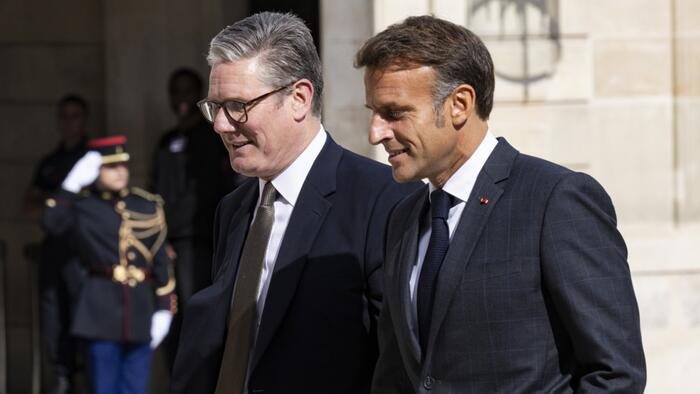


The British and French-led effort to establish a 'coalition of the willing' to stand up to Russia and defend Ukraine just hit another major roadblock, as Bloomberg is reporting Wednesday the US has effectively vetoed a plan to provide American air defenses to back a "reassurance force" for postwar Ukraine.
British Prime Minister Keir Starmer has been insisting that US-backed air defenses are key to any future permanent settlement plans for ending the war. Western proposals for ending the war have all featured foreign-backed and monitored security guarantees for Ukraine.
On this, Starmer had said back in February that "There must be a US backstop" and that the "US security guarantee is the only way to effectively deter Russia from attacking Ukraine again."
After Western billions already sunk into keeping Ukraine's military and civic infrastructure afloat, the UK and France are also seeking from President Trump pledges of future air power, and border surveillance and intelligence.
The Europeans also envision a strong, permanent security bulwark backed by the United States along NATO's eastern flank.
Yet, President Trump has repeatedly warned allies that if NATO countries don’t pay their fair share they won’t be protected. This despite European leaders as well as some US politicians expressing recent concern that the Atlantic alliance is becoming weaker than ever, and that Article 5 collective defense is in peril.
Trump has lashed out at NATO countries for not even meeting their current two percent spending goal while the unfair burden has long fallen United States.
"We appreciate the work that the allies, particularly France and the United Kingdom together with Germany and others have undertaken to develop the coalition of the willing," US Ambassador to NATO Matthew Whitaker said at a press breifing Brussels on Wednesday. "We are counting on all our European allies to continue taking the leadership position in contributing military resources and providing the political capital to make security guarantees a reality."
All of this comes as it was only on Tuesday that Dutch slapped down a proposal to increase defense spending to 3.5% of gross domestic product (GDP), key to NATO's capability targets, in a non-binding motion.
While it doesn't have legal force at this point, this makes clear parliament's opinion, unleashing deeper tensions among NATO allies, and as the Trump White House exerts pressure to rapidly raise collective defense.
Also, Bloomberg reported separately Tuesday, "NATO is asking European member states to expand ground-based air-defense capabilities fivefold as the alliance races to fill a key gap in response to the threat of Russian aggression, people familiar with the matter said."
All indicators are that the Trump administration no longer envisions the United States as heading up NATO, especially when other countries can't step up and pay their fair share.
Still, the UK and France are mapping out a plan: "The allied force — which would help ensure the security of Ukraine’s airspace, coastline and land by placing European troops away from the border at critical ports and infrastructure alongside continued deliveries of military hardware — is dependent on a peace settlement, which European officials think is increasingly unlikely," Bloomberg describes.
Of course, the other big problem in all of this is that Moscow has already made clear it will never accept NATO troops right along the border at its Ukrainian doorstep.
